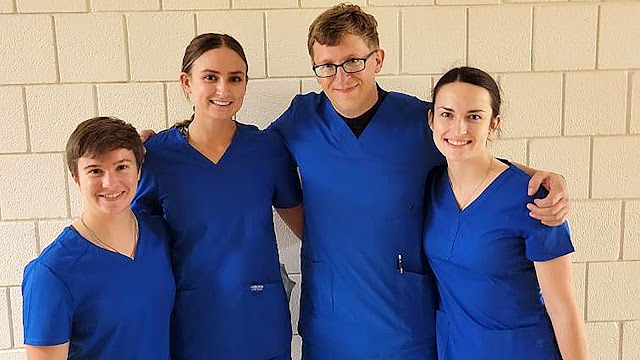Native American Medical Student Fulfills Her Life’s Calling at USU
By Vivian Mason
Air Force 2nd Lt. Samantha Williamson, a member of the Uniformed Services University (USU) School of Medicine’s (SOM) class of 2025, and her family are members of the Turtle Mountain Band of Chippewa Indians. This band consists of Ojibwa and Métis peoples who are based on the Turtle Mountain Indian Reservation in Belcourt, North Dakota. Today, Williamson finds herself far from home as she studies medicine at USU, aiming to fulfill her life’s purpose to care for her community.
.jpg) |
| Air Force 2nd Lt Samantha Williamson (Photo credit: Tom Balfour, USU) |
“Throughout my entire life, [my parents] emphasized the importance of school and making something of my life,” Williamson says. She explains that she follows a major philosophy that those who benefit from various opportunities and accomplishments have the responsibility to help others.
Williamson graduated from high school and went to the Air Force Academy in Colorado Springs, Colorado, where she earned a degree in philosophy. By that point, she had heard about USU from a few people and decided to apply. “I wanted to become a military doctor, and I wanted to go to a school where they could help me to do that. I thought that USU could give me the best education and training for what I wanted to do.”
Williamson adds that when she got to USU, she didn’t expect to see too many other Native American medical students, but would welcome those she encountered. “The way I looked at it was that me and other Native students were going to provide a Native American perspective within the medical community at USU. Therefore, I eagerly looked forward to this new experience.”
Medical school is challenging, she says, but the force that keeps her moving forward is her faith. “I feel like I’m doing what I’ve been called to do,” Williamson explains. “My Native American name is actually Dew in the Morning. When my grandfather gave me that name, he said that my calling in life would be to care for people, and I want to do just that. So, my name truly resonates with my purpose in this life. I want to make the people around me proud, and I want to do well. There’s just so much at stake.”
Being the oldest of eight children set the bar high for her to become successful. As an inspiring role model for them, Williamson made a personal commitment to help show her siblings the way. There’s a quiet strength that radiates within her. Being the eldest helped Williamson embrace being a leader. Even with life struggles, she helped with the daily care of her brothers and sisters. “Caring for them was a privilege,” she acknowledges. “Because of that, I learned to care for people and have wanted to continue doing so as part of my life’s work.”
Williamson sometimes feels the pressure, and has some common thoughts of self-doubt, but she is positive that medicine is what she should be doing. “There are so many things that had to line up perfectly in order for me to attend USU. Even when I become really overwhelmed; I reflect on that.”
Medical school is a journey, and having the right mindset and strategy for success is important. With a heavy class schedule, studying, labs, and a new marriage, Williamson knows that it is important to be adaptable and to keep an open mind.
“Getting comfortable with constant change has been a big strategy for me,” she says. “At this point, I don’t know what kind of doctor that I want to be yet. There are so many things that interest me. I just joined the Student National Medical Association, and they do outreach programs with minorities. I thought it would be nice just to talk to people and get to know them. I would really like to give back in some way. And, ideally, I’d like to advocate for the Native American community. For me, just talking about my heritage and my personal experiences have been a kind of advocacy.”
 |
| Williamson (pictured 2nd from the left) with her fireteam outside of the Anatomy Lab before class. (Photo courtesy of Air Force 2nd Lt. Samantha Williamson) |
Williamson says that she wants to improve the quality of healthcare for all people, but she has a special place in her heart for her Native people because they are so often underrepresented in medicine. Williamson recalls, when her grandfather was hospitalized, she never saw a Native American physician at the hospital, which was a major influence on her. In fact, she says, “I’m not sure if I’ve ever personally seen a Native American physician.”
Today, Williamson says she loves her culture and traditions, but notes that it wasn’t always that way. “I remember when I attended the Air Force Academy, there was a celebration called Acceptance Day. My grandfather came in full Native American regalia, but I was embarrassed by it. Now that I’m older, I can see how amazing it was for him to do that and honor me in that special way. He gave me a part of himself that day, and I didn’t know how to accept it. I think back and wish that I could change my actions. But, now I have a different perspective. I love that he was so proud because I’m proud, too.”
In her reflection, Williamson offers simple words of advice to her fellow Native American medical students: “Really embrace your culture and don’t be ashamed. You need to remember that when you practice medicine, you’ll give some of yourself to your patients as you heal them.
“What better way to give back to people than to serve them through medicine,” Williamson concludes, “taking care of children, families, and communities. My presence here at USU is playing a major part in making that happen.”





